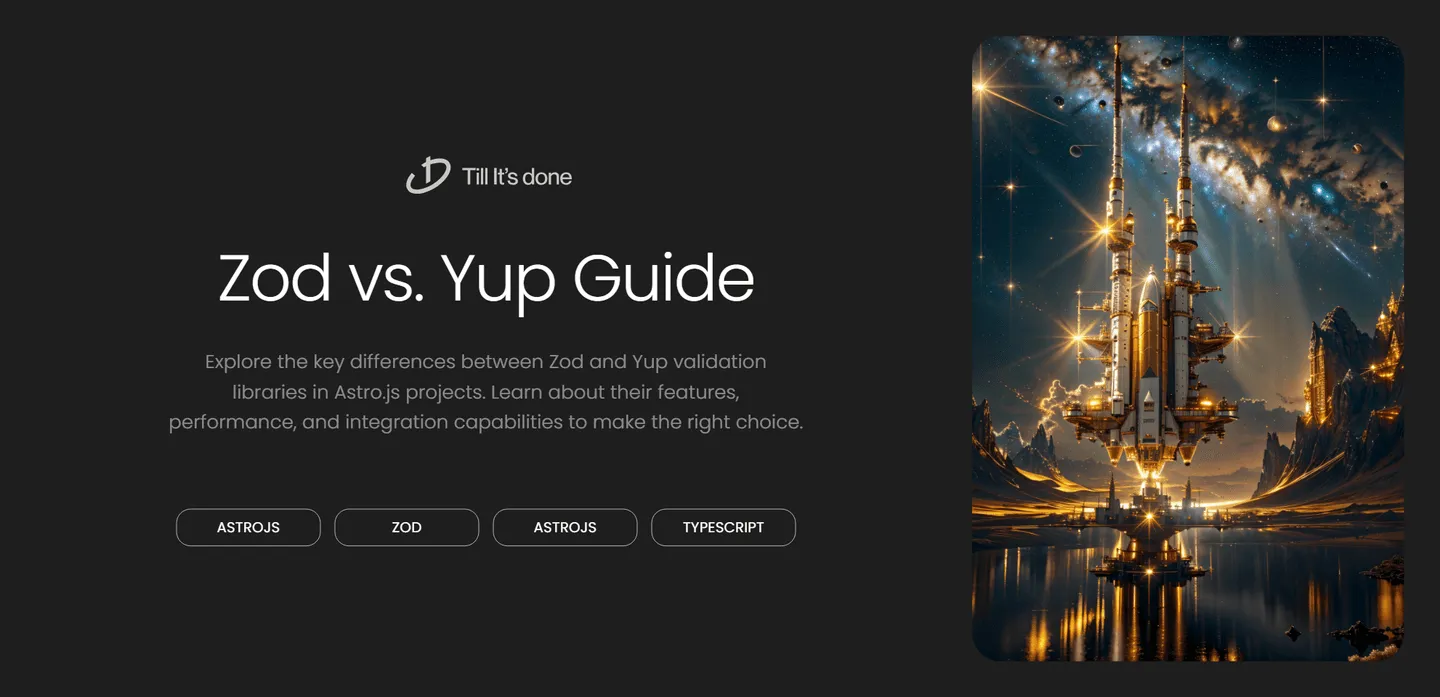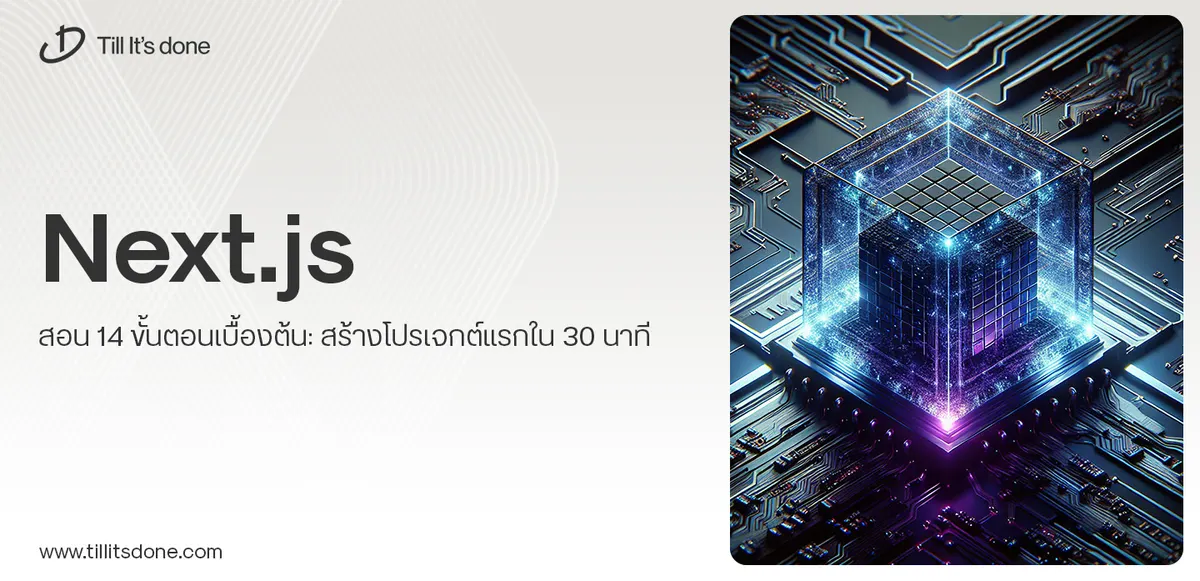- Services
- Case Studies
- Technologies
- NextJs development
- Flutter development
- NodeJs development
- ReactJs development
- About
- Contact
- Tools
- Blogs
- FAQ
Zod vs. Yup: Data Validation in Astro.js
Learn about their features, performance, and integration capabilities to make the right choice.


When building robust web applications with Astro.js, data validation is crucial for maintaining data integrity and providing a smooth user experience. Two popular validation libraries, Zod and Yup, have emerged as leading choices for developers. Let’s dive deep into their comparison to help you make an informed decision for your next Astro.js project.
Understanding the Basics
Zod and Yup are both TypeScript-first validation libraries that help ensure your data meets specific criteria before processing it. While they share similar goals, their approaches and features differ significantly.

Key Differences and Advantages
Type Inference
Zod shines when it comes to TypeScript integration. It offers superior type inference capabilities, automatically generating TypeScript types from your schema definitions. This means less manual type writing and better type safety throughout your application.
In contrast, Yup requires separate type definitions, although it still provides solid TypeScript support. For Astro.js projects heavily reliant on TypeScript, Zod’s approach might save you considerable development time.
Performance and Bundle Size
Yup has been around longer and has a slightly larger bundle size compared to Zod. For Astro.js applications where performance is crucial, Zod’s smaller footprint could be advantageous, especially when implementing server-side validation.

Syntax and Learning Curve
Yup’s API might feel more familiar to developers coming from JavaScript backgrounds, as it follows a chainable method pattern similar to many popular JavaScript libraries. For example:
const userSchema = yup.object({ name: yup.string().required(), age: yup.number().min(18)});Zod’s syntax is more concise and functional:
const userSchema = z.object({ name: z.string(), age: z.number().min(18)});Making the Choice
Choose Zod if:
- TypeScript integration is a priority
- You prefer a more modern, functional approach
- Bundle size is a critical concern
- You’re starting a new project
Choose Yup if:
- You need broader browser compatibility
- You prefer a more traditional, chainable API
- Your team is already familiar with it
- You’re maintaining an existing project that uses it
Integration with Astro.js
Both libraries integrate smoothly with Astro.js, especially when handling form validation or API requests. Here’s a practical example using Zod in an Astro.js API endpoint:
import { z } from 'zod';
export async function post({ request }) { const schema = z.object({ email: z.string().email(), message: z.string().min(10) });
const data = await request.json(); const result = schema.safeParse(data);
if (!result.success) { return new Response(JSON.stringify({ errors: result.error.issues }), { status: 400 }); }
// Process valid data}Conclusion
Both Zod and Yup are excellent choices for data validation in Astro.js projects. Zod’s modern approach and TypeScript integration make it particularly appealing for new projects, while Yup remains a solid choice, especially for teams already familiar with its ecosystem.

 สร้างเว็บไซต์ 1 เว็บ ต้องใช้งบเท่าไหร่? เจาะลึกทุกองค์ประกอบ website development cost อยากสร้างเว็บไซต์แต่ไม่มั่นใจในเรื่องของงบประมาณ อ่านสรุปเจาะลึกตั้งแต่ดีไซน์, ฟังก์ชัน และการดูแล พร้อมตัวอย่างงบจริงจาก Till it’s done ที่แผนชัด งบไม่บานปลายแน่นอน
สร้างเว็บไซต์ 1 เว็บ ต้องใช้งบเท่าไหร่? เจาะลึกทุกองค์ประกอบ website development cost อยากสร้างเว็บไซต์แต่ไม่มั่นใจในเรื่องของงบประมาณ อ่านสรุปเจาะลึกตั้งแต่ดีไซน์, ฟังก์ชัน และการดูแล พร้อมตัวอย่างงบจริงจาก Till it’s done ที่แผนชัด งบไม่บานปลายแน่นอน  Next.js สอน 14 ขั้นตอนเบื้องต้น: สร้างโปรเจกต์แรกใน 30 นาที เริ่มต้นกับ Next.js ใน 14 ขั้นตอนเพียงแค่ 30 นาที พร้อม SSR/SSG และ API Routes ด้วยตัวอย่างโค้ดง่าย ๆ อ่านต่อเพื่อสร้างโปรเจ็กต์แรกได้ทันทีที่นี่
Next.js สอน 14 ขั้นตอนเบื้องต้น: สร้างโปรเจกต์แรกใน 30 นาที เริ่มต้นกับ Next.js ใน 14 ขั้นตอนเพียงแค่ 30 นาที พร้อม SSR/SSG และ API Routes ด้วยตัวอย่างโค้ดง่าย ๆ อ่านต่อเพื่อสร้างโปรเจ็กต์แรกได้ทันทีที่นี่  วิธีสมัคร Apple Developer Account เพื่อนำแอปขึ้น App Store ทีละขั้นตอน อยากปล่อยแอปบน App Store ระดับโลก มาอ่านคู่มือสมัคร Apple Developer Account พร้อมเคล็ดลับ TestFlight และวิธีอัปโหลดที่ง่ายในบทความเดียวนี้ได้เลย
วิธีสมัคร Apple Developer Account เพื่อนำแอปขึ้น App Store ทีละขั้นตอน อยากปล่อยแอปบน App Store ระดับโลก มาอ่านคู่มือสมัคร Apple Developer Account พร้อมเคล็ดลับ TestFlight และวิธีอัปโหลดที่ง่ายในบทความเดียวนี้ได้เลย  TypeScript Interface คืออะไร? อธิบายพร้อมวิธีใช้และข้อแตกต่างจาก Type เรียนรู้วิธีใช้ TypeScript Interface เพื่อสร้างโครงสร้างข้อมูลที่ปลอดภัยและเข้าใจง่าย พร้อมเปรียบเทียบข้อดีข้อแตกต่างกับ Type ที่คุณต้องรู้ ถูกรวมเอาไว้ในบทความนี้แล้ว
TypeScript Interface คืออะไร? อธิบายพร้อมวิธีใช้และข้อแตกต่างจาก Type เรียนรู้วิธีใช้ TypeScript Interface เพื่อสร้างโครงสร้างข้อมูลที่ปลอดภัยและเข้าใจง่าย พร้อมเปรียบเทียบข้อดีข้อแตกต่างกับ Type ที่คุณต้องรู้ ถูกรวมเอาไว้ในบทความนี้แล้ว  Material-UI (MUI) คืออะไร อยากสร้าง UI สวยงามและเป็นมืออาชีพในเวลาอันรวดเร็วใช่ไหม มาทำความรู้จักกับ Material-UI (MUI) ที่ช่วยให้คุณพัฒนาแอปพลิเคชันบน React ได้ง่ายและดูดีในทุกอุปกรณ์
Material-UI (MUI) คืออะไร อยากสร้าง UI สวยงามและเป็นมืออาชีพในเวลาอันรวดเร็วใช่ไหม มาทำความรู้จักกับ Material-UI (MUI) ที่ช่วยให้คุณพัฒนาแอปพลิเคชันบน React ได้ง่ายและดูดีในทุกอุปกรณ์  เปรียบเทียบ 3 วิธีติดตั้ง install node js บน Ubuntu: NVM vs NodeSource vs Official Repo แบบไหนดีที่สุด? เรียนรู้วิธีติดตั้ง Node.js บน Ubuntu ด้วย NVM, NodeSource หรือ Official Repo เลือกวิธีที่เหมาะกับความต้องการของคุณ พร้อมเปรียบเทียบ เพื่อการพัฒนาที่มีประสิทธิภาพ!
เปรียบเทียบ 3 วิธีติดตั้ง install node js บน Ubuntu: NVM vs NodeSource vs Official Repo แบบไหนดีที่สุด? เรียนรู้วิธีติดตั้ง Node.js บน Ubuntu ด้วย NVM, NodeSource หรือ Official Repo เลือกวิธีที่เหมาะกับความต้องการของคุณ พร้อมเปรียบเทียบ เพื่อการพัฒนาที่มีประสิทธิภาพ! Talk with CEO
We'll be right here with you every step of the way.
We'll be here, prepared to commence this promising collaboration.
Whether you're curious about features, warranties, or shopping policies, we provide comprehensive answers to assist you.


